

Neil Harbisson: I listen to color. Silly Beliefs - Respect My Religion! Introduction The Decline of ReligionRespect Our ReligionTolerate our Religion Readers' Comments Introduction In NZ and in an increasing number of countries religion has a major problem on its hands — the majority of citizens are no longer ignorant and uneducated.
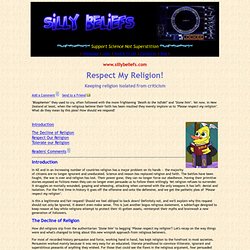
Science and reason has replaced religion and faith. Is this a legitimate and fair request? The Decline of Religion How did religions slip from the authoritarian "Stone him" to begging "Please respect my religion"? For most of recorded history persuasion and force, working hand in hand, has kept religion to the forefront in most societies.
Of course many intelligent people throughout history have questioned religion, but most still found themselves concurring that while obvious flaws exist, the overall premise that a god created the world must be true. Top 5 Tips for Applying to Singularity University. David Pearce (philosopher) Pearce co-founded Humanity+, then known as the World Transhumanist Association, and is a prominent figure in the transhumanism movement, inspiring a strain of transhumanism based on paradise engineering and ending suffering.[7][8][9] Pearce is primarily known as the author of The Hedonistic Imperative, a 1995 book-length manifesto in which he theorizes how to "eradicate suffering in all sentient life" through paradise engineering.[11] In Pearce's view, suffering is not necessary for humans and only exists because humanity evolved through methods that emphasized survival, rather than happiness.[12] He writes that mental suffering will someday be seen as a relic of the past, just as physical suffering during surgery was effectively eliminated with the advent of anesthesia.[13]
Richard Dawkins Discusses Discrimination Against Atheism. The Big Idea: a network of godless congregations. This is a guest blog from Sanderson Jones FRSA who along with Pippa Evans set up the Sunday Assembly.
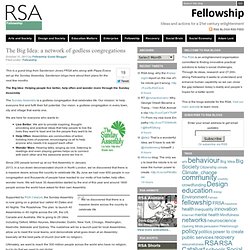
Sanderson blogs here about their plans for the next few months. The Big Idea: Helping people live better, help often and wonder more through the Sunday Assembly The Sunday Assembly is a godless congregation that celebrates life. Our mission: to help everyone find and fulfil their full potential. Our vision: a godless congregation in every town, city and village that wants one. We are here for everyone who wants to: Kurzweil Accelerating Intelligence. “Transhumanism” by Julian Huxley (1957) Technology & the Future.
FM-2030. FM-2030 (October 15, 1930, Brussels – July 8, 2000, New York) was an author, teacher, transhumanist philosopher, futurist and consultant.[1] FM-2030 was born Fereidoun M.
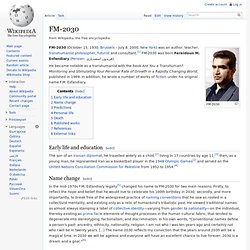
Esfandiary (Persian: فریدون اسفندیاری). He became notable as a transhumanist with the book Are You a Transhuman? : Monitoring and Stimulating Your Personal Rate of Growth in a Rapidly Changing World, published in 1989. In addition, he wrote a number of works of fiction under his original name F.M. Esfandiary. Early life and education[edit] The son of an Iranian diplomat, he travelled widely as a child,[2] living in 17 countries by age 11;[3] then, as a young man, he represented Iran as a basketball player in the 1948 Olympic Games[2] and served on the United Nations Conciliation Commission for Palestine from 1952 to 1954.[4] Name change[edit] In the mid-1970s F.M.
Predictions[edit] Personal life[edit] Death[edit] Published works[edit] Fiction Non-fiction. Technoprogressive Wiki. Transhuman is a term that refers to an evolutionary transition from the human to the Posthuman.
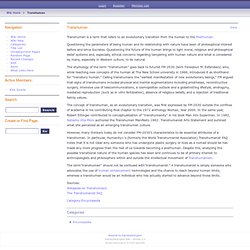
Questioning the parameters of being human and its relationship with nature have been of philosophical interest before and since Socrates. Questioning the future of the human brings to light moral, religious and philosophical belief systems and, especially, ethical concerns regarding tampering with human nature and what is considered by many, especially in Western culture, to be natural. The etymology of the term “transhuman” goes back to futurist FM-2030 (born Fereidoun M. Esfandiary) who, while teaching new concepts of the human at The New School university in 1966, introduced it as shorthand for “transitory human.” Transhumanist FAQ. The Transhumanist FAQ was developed in 1998 and authored into a formal FAQ in 1999 through the inspirational work of transhumanists, including Alexander Chislenko, Max More, Anders Sandberg, Natasha Vita-More, James Hughes, and Nick Bostrom.
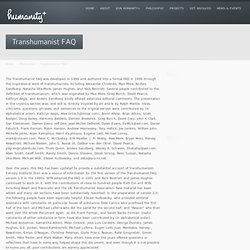
Several people contributed to the definition of transhumanism, which was originated by Max More. Greg Burch, David Pearce, Kathryn Aegis, and Anders Sandberg kindly offered extensive editorial comments. The presentation in the cryonics section was, and still is, directly inspired by an article by Ralph Merkle. Over the years, this FAQ has been updated to provide a substantial account of transhumanism. Extropy Institute (ExI) was a source of information for the first version of the Transhumanist FAQ, version 1.0 in the 1990s. Thank you to all who have contributed in the past and to those who offer new insights to this FAQ! GeneralWhat is transhumanism? PracticalitiesWhat are the reasons to expect all these changes?
[ Return to top ] About the Institute for Ethics and Emerging Technologies. 20 Essential Books About the Next Step in Human Evolution. Hm, I dunno.
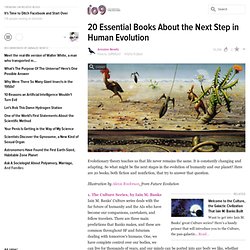
Natural (as in, not being directed by humans or a third party. It seems many of the examples on this list are not of the natural sort) evolution is something that one can't really predict. A species (or if you want to nitpick, a population of a species) evolves when environmental conditions demand it. So we can't really make a good guess how any species will evolve unless we know in advance how their environment is going to change. Though considering that humans are the only species with the concept of genetics and evolution, (well, as far as we know...) to what degree does "natural" evolution really apply to us? I'm left thinking about a couple things. (10) Transcendent Man. Ray Kurzweil.